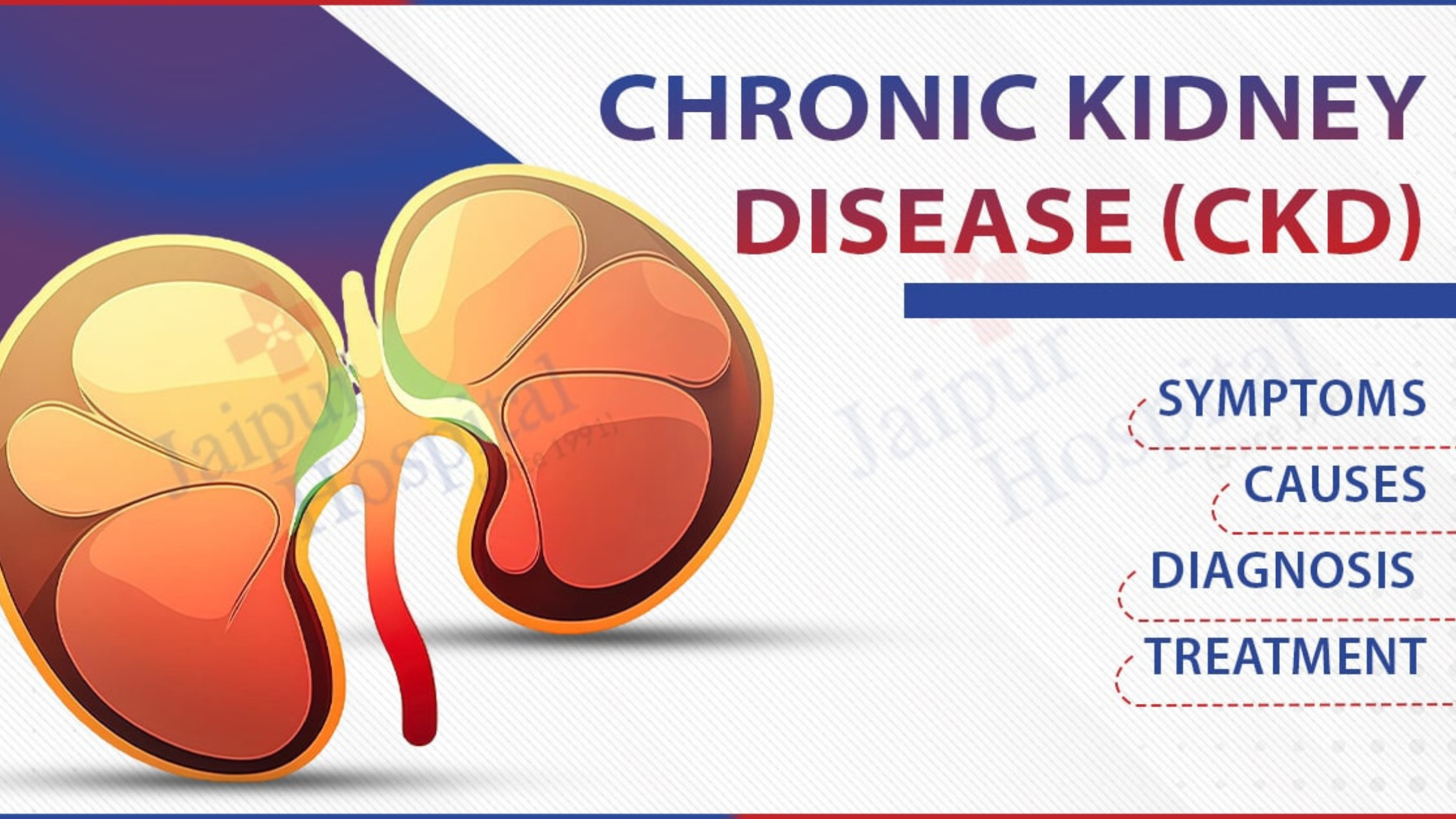Introduction
Chronic Kidney Disease is a disorder wherein kidney function is progressively lost over time. Kidneys remove waste and excess fluids from the blood and perform this very important process. Impairment of kidneys may result in very severe health complications. In its later stages, progression is usually silent, and signs and symptoms include fatigue, swelling, and changes in the urine.
Many causes characterize this disease, which includes diabetes, high blood pressure, and possible genetic orientations. This all-inclusive overview will have the capacity to respond to symptoms that affect CKD. The main causes and the diagnostic tests that may be used to identify the disease. Finally, a wide variety of treatments will be discussed, from lifestyle changes and medications to advanced interventions like dialysis and kidney transplantation. To understand CKD, whether for prevention, early detection, or good management, this guide will try to provide exhaustive and resourceful material to delve into.
Read This Also: Blood Clot in Brain: Symptoms, Diagnosis & Treatment
Stages of chronic kidney disease
It is classified into five stages according to its development stage based upon the glomerular filtration rate, considered a measure of how well the kidneys filter waste and excess fluid from the blood. Stages guide the treatment and also estimate the degree of kidney damage:
- Stage 1: Normal or High Kidney Function (GFR ≥ 90 mL/min): Kidneys functioning normally but with evidence of damage, such as protein or blood in the urine. Typically asymptomatic. Management of underlying diseases, such as diabetes or hypertension, and a lifestyle that is therefore supportive of the kidneys.
- Stage 2: Mild Kidney Damage (GFR 60–89 mL/min): Mild impairment with evidence of damage. Occasional or mild manifestations, including fatigue or hypertension. Monitoring kidney function; managing factors that contribute to disease progression; retardation of disease progression.
- Stage 3: Moderate Kidney Damage (GFR 30–59 mL/min): There are two stages: Stage 3A, with GFR 45–59, and Stage 3B, with GFR 30–44. Fatigue, swelling, changes in urine color or frequency, and mild anemia. Prevent complications, relieve symptoms, and manage related problems.
- Stage 4: Severe kidney impairment GFR 15–29 mL/min: Loss of major kidney function. More pronounced, including nausea, edema, bone pain, and worsening anemia. Preparing for potential renal replacement therapies such as dialysis or transplant.
- Stage 5: End-Stage Renal Disease, GFR < 15 mL/min: They are unable to function properly. Acute, including inability to take food, breathlessness, and complications caused by the buildup of toxins. Salvage treatments like dialysis or transplant of the kidneys.
Symptoms of chronic kidney disease
Chronic Kidney Disease symptoms may be quite asymptomatic at their onset and do not appear until much kidney damage has been sustained. These symptoms are typically seen based on the severity of the condition or the reason behind the disease. Here are the common symptoms usually associated with CKD:
- Fatigue and Weakness – Primarily Due to Anemia Caused by Renal Failure.
- Loss of Appetite – The accumulation of toxins in the blood proves nauseating and lowers levels of appetite.
- Sleep Disorders – Imbalances in minerals and toxins cause insomnia or restless legs disorder.
- Swelling (edema): Fluid retention causes puffy legs, ankles, feet, or face due to excess fluid.
- Difficulty in breathing – Fluid-filled the lungs with labored breathing.
- Changes in urination – Increased, decreased, or painful urination may be indicative of kidney disease.
- Foam or Dark-coloured Urine – Leakage or blood in urine indicates the damage of kidneys.
- Poor Concentration Ability – Encephalopathy is caused by toxin accumulation in the blood.
- Muscle Cramps – The commonly involved electrolytes are especially calcium and phosphorus.
- High Blood Pressure – They can not control fluid and salt; therefore, their use creates hypertension.
- Itchy Skin (Pruritus) – Waste products in the blood irritate the skin.
- Metal Taste – Uremia alters the flavor, which persists with a lingering metallic taste.
- Sudden, unexplained weight loss – Nutrient malabsorption and decreased appetite cause sudden weight drop.
Causes of chronic kidney disease
Chronic Kidney Disease CKD Chronic kidney disease is the gradual loss of kidney function over time. Other causes that result in CKD are:
- Diabetes Type 1 and Type 2: Long-standing high levels of glucose in the blood damage the filtering apparatus of the kidney, causing diabetic nephropathy
- High Blood Pressure: High blood pressure damages the blood vessels of the kidneys resulting in impaired function
- Glomerulonephritis: Inflammation of the filtering units of the kidney (glomeruli) results in scarring.
- PKD: Genetic disease in which cysts develop on the kidneys and hinder their functioning.
- Autoimmune Disorders: Lupus and other such diseases inflame and destroy the tissues of the kidneys.
- Chronic Obstruction of Urinary Tract: Repeated obstruction by kidney stones or enlarged prostate greatly reduces the efficiency of kidneys.
- Chronic Pyelonephritis: This disease is associated with a persistent infection that scars and eventually chronically destroys the kidneys
- Medications: Overuse of painkillers, NSAIDs, or certain antibiotics for prolonged periods endangers the kidneys.
- Exposure to Toxins: Heavy metals such as lead or solvent exposure for a long time can damage the kidney cells.
- Family History of Kidney Disease: Genetic vulnerability makes you prone to CKD.
- Heart Disease: Cardiovascular disease affects blood circulation in your kidneys thereby influencing the kidney’s performance
- Obesity: Excessive body weight puts pressure on your kidneys and other diseases like diabetes or hypertension.
- Aging: As we age, natural aging gradually deteriorates kidney function, making us vulnerable to CKD.
Diagnosis of chronic kidney disease
Diagnosis of Chronic Kidney Disease (CKD) typically involves interviewing someone about their medical history, physical examination, and more diagnostics to assess the state of the kidneys. The most common steps for CKD diagnosis include the following:
- Medical History and Physical Examination: This usually involves a review of symptoms, family history, and other risk factors like diabetes or hypertension.
- Blood Tests:
- Serum Creatinine: High levels indicate poor kidney function.
- Estimated Glomerular Filtration Rate (eGFR): Estimated kidney function is determined using creatinine levels, age, sex, and race.
- Urinalysis: This helps to detect the presence of blood, proteins, or other abnormalities in urine.
- Albumin-to-Creatinine Ratio (ACR): This measures albumin, a protein found in urine, and helps establish the level of kidney damage.
- Imaging Tests
- Ultrasound or CT Scan: Imaging of the kidneys is conducted to look for anatomical anomalies, cystic enlargement, or obstructions.
- X-ray or MRI: Used in complicated cases.
- Kidney Biopsy:
- A small portion of kidney tissue is sampled and observed under the microscope to determine the extent and type of damage.
- Electrolyte and Mineral Levels:
- Studies on levels of potassium, sodium, calcium, and phosphorus due to impaired kidney function.
Risk factors of chronic kidney disease
CKD can arise as a result of interaction among genetic, lifestyle, and medical risk factors. The following are the main risks involved in developing and progressing CKD:
- Diabetes: Elevated blood sugar damages the kidneys.
- Hypertension: Long-term high blood pressure stresses and injures blood vessels within the kidneys.
- Family History: Genetic susceptibility puts someone at higher risk of developing CKD.
- Age: The probability increases with age, especially over 60, because kidney function naturally decreases.
- Obesity: Causes overweight, which can lead to diabetes, hypertension, and extra renal exertion.
- Heart Disease: Atherosclerotic disease negatively impacts flow to the kidneys.
- Smoking: Impairs blood circulation to the kidneys and worsens renal injury.
- Chronic Urinary Tract Disorders: Repeated infections or obstruction, for example, kidney stones or enlargement of the prostate gland, increase the risk.
- Autoimmune Diseases: Diseases like lupus may cause inflammation and damage to the kidneys.
- Overuse of Medication: The overuse of drugs, such as NSAIDs, certain painkillers, or nephrotoxic drugs can cause direct damage to renal function.
Treatment of chronic kidney disease
Treatment for CKD includes slowing the progression of the disease and control of the symptoms plus complications. This is achieved through strategies based on the stage of the disease plus the underlying causes:
- Medications
- Blood Pressure Management: For patients with CKD, ACE inhibitors or ARBs are used to protect the kidneys as well as decrease proteinuria.
- Blood Sugar Control: Drugs such as insulin or SGLT2 inhibitors in diabetic patients.
- Treatment of Anemia: Patients with low hemoglobin levels receive iron supplements, erythropoietin-stimulating agents, or vitamin B12.
- Phosphate and Calcium Balance: Use phosphate binders and vitamin D supplements to prevent bone disease.
- Cholesterol-lowering Drugs: Use statins, which are cholesterol-lowering drugs to lower the risk of cardiovascular diseases.
- Treatment of the Underlying Causes
- Treat the underlying diseases such as diabetes, hypertension, glomerulonephritis, or autoimmune diseases through appropriate therapies.
- Prevention of Complications
- Edema (Fluid Retention): Administer diuretics to reduce swelling
- Metabolic Acidosis: Provide sodium bicarbonate supplement to regulate acidic blood
- Infections: Immediately treat urinary tract infections or kidney infections.
- Advanced Therapies for End-Stage CKD (Stage 5)
- Dialysis:
- Hemodialysis: The blood is made to flow out of the body from filters using a dialysis machine
- Peritoneal Dialysis: The peritoneum inside the abdominal cavity filters waste out of the body
- Transplantation of the Kidneys: A transplanted kidney is given to the patient, which replaces the diseased organ.
- Follow up
- Routine blood and urine analysis for assessing the functions of the kidneys and finding the deteriorating conditions as soon as possible.
Prevention of chronic kidney disease
Early intervention and lifestyle change prevent people from contracting CKD or slow the progression of kidney disease in those already afflicted. Prevention of CKD: Effective Techniques to Prevent CKD
Manage Your Blood Sugar: Effective management of your diabetes prevents progressive damage to your kidneys over time.
- Maintain Healthy Blood Pressure: Preventive measures to control high blood pressure reduce the workload of the kidneys and damage is minimized.
- Kidney-Friendly Diet: Reduce salt, protein, and processed foods intake to minimize the workload on your kidneys.
- Maintain an Active Lifestyle: Exercise regularly to maintain proper weight and improve cardiovascular health, thus reducing the risk of CKD.
- Avoid Smoking and Alcohol in Excessive Amounts: Smoking causes poor blood flow, and excess use of alcohol can cause a strain on the kidneys.
- Drink Enough Water: Proper water intake ensures proper filtration by the kidneys.
- Be Vigilant about Medication Usage: Do not use NSAIDs for a long duration or take nephrotoxic medication as it might prove adverse for the kidneys.
- Get Regular Medical Check-Ups: Early diagnosis of any kidney-related disorders will help take timely actions.
- ACT early on infections to avoid permanent damage caused by UTIs and kidney infections.
- Healthy weight: As obesity is a key risk factor for CKD, maintain body weight through a balanced lifestyle.
Conclusion
Chronic Kidney Disease is a progressively deteriorating condition, which, without proper treatment can progress toward kidney failure. Early diagnosis and treatment are crucial in the fight to slow the disease’s progression but also address complications stemming from the condition. Preventive measures, such as the control of blood pressure and diabetes, food adaptation into a diet consistent with kidney-friendly food intake, and smoking cessation, are all important aspects to be maintained in the preservation of renal function.
People with CKD or at risk of developing it, require constant screening and medical care. CKD generally falls under the supervision of the Nephrology Department which deals with the issues of kidney. As Jaipur Hospital is renowned for its proper management of kidney diseases, patients with CKD get specialized treatment with better options for diagnosis and therapy that elevate the outcome and quality of life.


